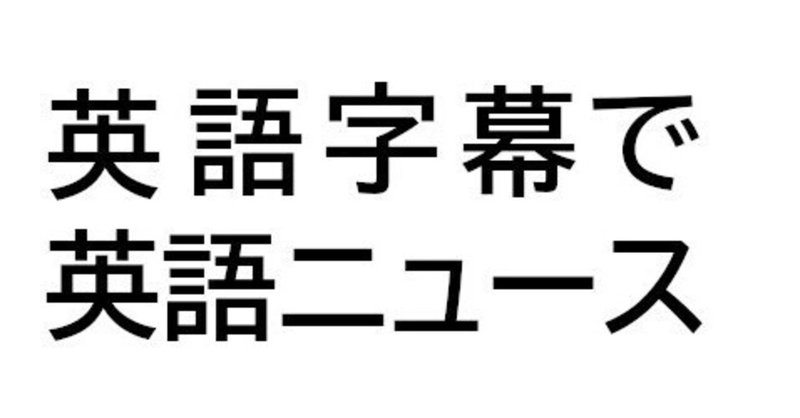
今日の英語ニュース☆2023.10.22☆時事英語・ニュース英語を極める
PBS News Weekend Oct. 21, 2023
上のリンクの動画には字幕がついていますが、音声とずれていたり間違いが多かったので、このサイトのトランスクリプトに訂正を加えたものをアップロードします。すべて大文字表記のものを、全部小文字に変換してから使いました。
動画サイトの週末版の字幕は、翌日以降に比較的正確なものに差し替えられるようです。
それでは、今日も一緒に英語のニュースを見ていきましょう!
■ 動画サイトへのリンク
・直接動画サイトを見る場合のリンクです
・分からない言葉はこの2つの辞書でたいてい見つかると思います
[00:00] Introduction
[02:00] Humanitarian relief arrives in Gaza as Israel prepares to step up attacks
The first truckloads of supplies were allowed into Gaza from Egypt on Saturday, a small but significant aid delivery after nearly two weeks of war. Meanwhile, Israel’s military is vowing to increase its airstrikes against the Hamas-led territory and the possibility of an Israeli ground invasion still looms large. Special correspondent Leila Molana-Allen reports.
《イスラエルとハマスの戦い15日目; ガザへの人道支援物資の搬入始まる; more than 1400 Israelis and nearly 4400 Palestinians killed since the start of the conflict; Rafah Border Crossing; UNICEF says the drinking water sent today is only enough for 22,000 people for one day. Gaza's population is approximately 2 million people, with 80% already relying on aid before the war; ラファ検問所; 》
[05:26] From tension in Israel to relief in the U.S. In Illinois, the family of freed Hamas hostages Natalie and Judith Raanan looked forward to their homecoming. [** 関連ニュース ]
[05:53] News Wrap
New numbers from the U.S. Treasury Department showed the nation’s deficit has increased nearly 25 percent to $1.7 trillion in the last fiscal year, and at least four people have died in the torrential storm hitting parts of Europe for a third day.
[07:16] UN aid chief hopes to increase flow of critical supplies to Gaza
Twenty trucks of humanitarian aid crossed into Gaza from Egypt on Saturday, the first life-saving supplies to reach Gazans since the Israel-Hamas war began. Before the Oct. 7 attack by Hamas, 450 trucks of aid arrived daily in Gaza. UN aid chief Martin Griffiths joins Lisa Desjardins to discuss what this new aid means for the humanitarian crisis in Gaza.
《国連の人道支援責任者、マーティン・グリフィス人道問題担当事務次長へのインタビュー; UNWRA; 国連パレスチナ難民救済事業機関 》
[11:36] Now, UNWRA, which is this amazing U.N. organization which knows Gaza backwards, has cut its water rations from 15 liters per person per day down to one liter, a person per day. And, when the fuel runs out and the water runs out, you're not going to survive.
[** to know (something) backwards = To be extremely familiar with a particular subject ]
[14:03]★今日のおすすめ★ A child psychologist’s advice for talking with kids about the Israel-Hamas war
Since the start of the Israel-Hamas war, news and social media have been filled with horrific images and stories of civilians killed, wounded and taken hostage. This information can be especially tough for kids to digest. Duke University child psychologist Robin Gurwitch joins Yasmeen Alamiri to discuss how adults can talk about this difficult issue with kids.
《戦争について子どもとどう話すか; 児童心理学者に聞く; Robin Gurwitch, Duke University; Yasmeen Alamiri, Senior Editor for video and special projects at the PBS NewsHour; do we talk to our kids about the war at all? -- absolutely positively yes; when we don't talk about difficult things, children may not bring it up because they are worried they are going to upset you; all of the science tells us if adults will bring it up, they have a better chance of helping children cope with what is going on, take a deep breath, and jump into that conversation; 》
[20:16]★今日のおすすめ★ Swim safety advocates aim to overcome historic racial inequities
Learning how to swim is a rite of passage for many, but a surprising number of American children can’t swim. Part of that comes down to access and restrictions rooted in racism that have kept generations of swimmers out of pools. Isabella Jibilian of Rhode Island PBS reports.
《子供の溺死、人種による違いとその背景にある人種差別の歴史; Isabella Jibilian, Rhode Island PBS; Mara Gay, New York Times; according to the Centers for Disease Control and Prevention, Black children are 1.5 times more likely and native American children are 2 times more likely than white children to die of drowning; for Black Americans, that gap is rooted in slavery; so black Americans, many people know we were not allowed to learn how to read during slavery. many times they also weren't allowed to learn how to swim, and that's because it would've made it easier to escape to freedom. dogs couldn't track your scent in water, which was known among enslaved Americans. during segregation, you had public pools that were not open to black Americans; even after segregation ended, many black Americans were still unwelcome; many communities across the South, but also elsewhere, unfortunately, chose to fill in, destroy or close their public pools, rather than allow Black Americans to swim in them. So, white wealthier Americans who were able to, started forming their own clubs, their own neighborhood associations that were, of course, segregated. and the rest of America was shut out; Orca Aquatics; Swim Empowerment, a program to sponsor swim lessons for black and low-income youth; 》
[22:14] Isabella: Even after segregation ended, many Black Americans were still unwelcome. Storyteller V Raffini grew up in Rhode Island.
>> Pools were not segregated but they were racist, and when we got there, we dealt with the racism. I can remember them calling us names like the walking Tootsie Roll, or there's a Hershey Bar in the pool. you know, all straight out, coming out with the n-word.
[** Tootsie Roll = a chocolate-flavored taffy // taffy = A soft, chewy candy made from boiled sugar, molasses, or corn syrup and butter ]
[** Hershey Bar = a chocolate bar manufactured by The Hershey Company ]
[** n-word = (euphemistic) nigger // nigger = (extremely offensive 差別的、使用不可) A black person ]
■ おすすめの辞書(時事英語やニュース英語に強い辞書)
■ 英語のラジオを聞く(BGM代わりにCNNやBBC)
■ 英語のテレビを見る(NBC News ・ ABC News)
・このnoteの価値を理解していただける方 ・このnoteの記事はすべて無料の方がいいと思う方 ・このnoteの筆者が執筆に集中出来るように支援したい方 ・このnoteの安定運営のために提案があるという方。 下のコメント欄か「クリエイターへのお問い合わせ」でお知らせください。
